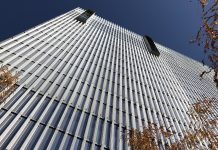
June 16 (UPI) — Federal Reserve Chairman Jerome Powell told lawmakers Tuesday there’s “significant uncertainty” about exactly how long it will take for the U.S. economy to recover from the impact of the coronavirus pandemic.
In remote testimony before the Senate banking committee, the Fed chief said there are too many factors to consider when looking at the near-term picture — even though there have been some indications the domestic economy has begun to bounce back.
The Commerce Department surprised Wall Street shortly before the Senate hearing began by reporting that U.S. retail sales surged by a record 17.7 percent in May, far exceeding what most experts predicted.
Powell said, however, the bigger picture is a bit murky.
“The levels of output and employment remain far below their pre-pandemic levels, and significant uncertainty remains about the timing and strength of the recovery,” he told the committee. “Much of that economic uncertainty comes from uncertainty about the path of the disease and the effects of measures to contain it.”
“Until the public is confident that the disease is contained, a full recovery is unlikely,” he said.
Powell echoed remarks he made last week at a meeting of the Federal Open Market Committee, when it voted to leave interest rates unchanged and said they would probably stay that way until at least 2022.
Tuesday is the first of two days of congressional testimony for Powell, who gave the second of two regular semiannual updates on the U.S. economy. He last appeared in February, before the severity of the health crisis arrived in the United States.
In his testimony, Powell also noted that the COVID-19 impact is particularly pronounced for small businesses and minorities.
“If a small or medium-sized business becomes insolvent because the economy recovers too slowly, we lose more than just that business,” he said. “These businesses are the heart of our economy and often embody the work of generations.”
Powell added that the Fed will base corporate bond-buying moves on market conditions and will not attempt to control the debt market by wielding clout.
“I don’t see us wanting to run through the bond market like an elephant snuffing out price signals, things like that,” he said.
At the first congressional meeting in February, Powell warned that the central bank may lack the tools to fight off a recession, saying “it would be important for fiscal policy to support the economy if it weakens” given the interest rates at the time, which were between 1.5 and 1.75 percent.
At the time, Powell said the Fed would use qualitative easing, the process of buying large amounts of government debt to drive down long-term interest rates, to fight economic downturn.
In the Fed’s report, issued Friday, the U.S. central bank said the COVID-19 pandemic has caused “tremendous human and economic hardship” throughout the United States and the world and cited a decline in economic activity, a surge in joblessness, weaker demand and low oil prices.
“Financial conditions have improved, in part reflecting policy measures to support the U.S. economy and the flow of credit,” the report says. “The Federal Reserve is committed to using its full range of tools to support the U.S. economy in this challenging time, thereby promoting its maximum-employment and price-stability goals.”
The Fed on Monday updated its Secondary Market Corporate Credit facility and expanded its reach to buy individual corporate bonds and exchange-traded funds.






